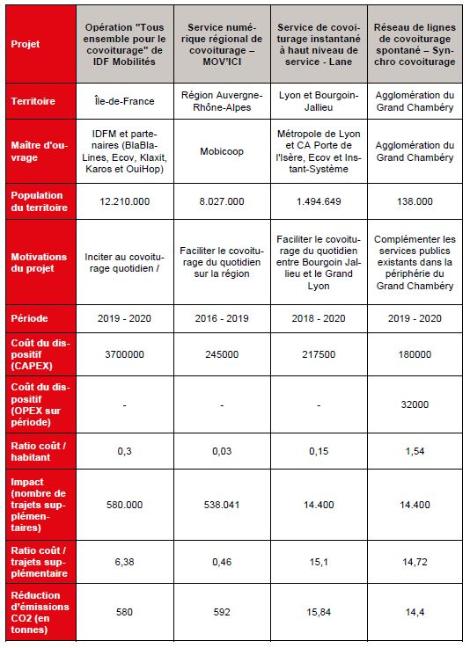Feedback on car-sharing policies
décembre 2023
Car-sharing is the joint use of a vehicle by a non-professional driver and one or more passengers to make all or part of a journey initially planned by the driver. The practice must not be remunerated, apart from the sharing of travel costs. In 2023, the first year of implementation of the car-sharing plan, a significant increase in the number of journeys made using car-sharing platforms was recorded (x 2.3 between the first half of 2022 and the first half of 2023). Local public policies to encourage the development of car sharing are becoming more structured and more widespread. Here are four concrete examples.
1 - ‘Tous ensemble pour le covoiturage’, Île-de-France
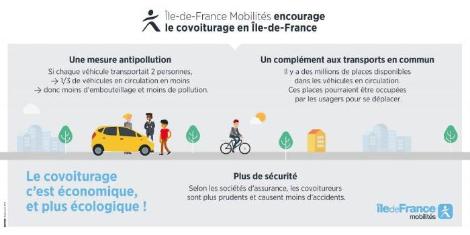
The ‘Tous ensemble pour le co-voiturage’ operation is an initiative of Ile-de-France Mobilités, established in the form of partnership agreements with short-distance car-sharing operators. Several experimental editions have taken place since October 2017, involving subsidies for operators who undertake to pay out grants to drivers and offer free journeys to passengers with a valid public transport season ticket. Carpooling journeys are available in the SNCF app, with redirection to the chosen operator’s app to finalise the booking. The first edition subsidised almost 500,000 passenger journeys for a budget of €1.1 million, involving eight partner operators. The second edition involved five partners and supported around 1.4 million passenger journeys for a budget of 3.7 million euros. The third edition was not implemented due to conflicts with the operators.
A fourth edition was implemented in 2022. This provided for two types of support: direct remuneration of the operator based on the number of passenger journeys made, and support for developments aimed at integrating the operator’s services into the Île-de-France Mobilités MaaS.
The first aid scheme applies during ‘normal periods’, with an allowance of €1.50 per passenger up to 15 km, then €0.10 per km beyond that, capped at €3 per passenger journey. Passengers with a Navigo subscription are entitled to two free journeys per day up to a maximum of 30 km per journey. The second scheme applies in the event of ‘major transport disruption’ and ‘pollution peaks’, with increased compensation for drivers and free travel for all passengers. Direct remuneration to the operator is capped at €100,000 excluding VAT. The Carpooling Proof Register is used to monitor fraud and track journeys eligible for subsidy.
Results
The ‘Tous ensemble pour le covoiturage’ operation co-financed almost 1.9 million journeys between October 2017 and June 2020, with a subsidy of €4.8 million. Business has grown strongly, from 10,000 subsidised journeys per month in 2017 to more than 170,000 journeys per month in February 2020. The Karos app recorded 223,000 journeys, mainly in rural and peri-urban areas, 79% of which were in the inner suburbs.
2 - ‘MOV’ICI’, Auvergne-Rhône-Alpes
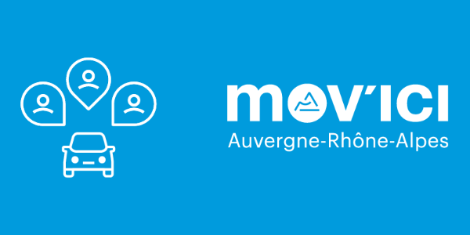
MOV’ICI is a digital car-sharing service in Auvergne-Rhône-Alpes, developed in open source by Mobicoop. It puts carpoolers in touch with each other for journeys to and from work, school, leisure activities, etc. The platform is free of charge, and can be used for scheduled or instantaneous carpooling. Communities of carpoolers are created online to share journeys based on common interests. Drivers are paid by their passengers via an electronic wallet. MOV’ICI provides proof of journeys (certification) for carpooling incentives. The service is interoperable with other platforms, and a new, improved version is planned for September 2020.
Results
From the launch of the platform in 2016 to the end of December 2019, 389,441 journeys have been published, including 148,600 journeys for 2019. Over the same period, 639,185 connections have been made, including 298,666 for 2019.
3 - ‘Lane’, Lyon and Bourgoin-Jallieu
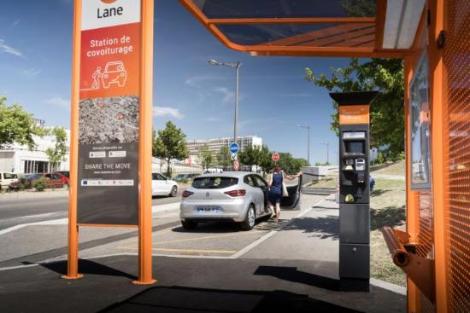
Lane is a real-time, reservation-free car-sharing service linking various districts and employment centres in the Lyon and Bourgoin-Jallieu conurbations. Complementing the existing public transport network, it operates during peak full stops from Monday to Friday. Passengers can request carpooling via connected terminals, a mobile application, or by SMS/telephone. Drivers register their journeys on the application and can accept passengers en route. Compensation is €2 per passenger and journey, with an additional €1 for empty seats. Lane offers guarantees if it is impossible to complete the planned journey. The service is the result of a public/private partnership and has received support from ADEME and the European Union.
Results
Lane saves almost €300/month per passenger carpooling between Lyon and Bourgoin. 80% of users were previously car-pooling. The service has grown, with almost 400 regular users and 800 journeys/month by February 2020. The cost of installing the stations varies from €4,000 to €25,000. The target operating cost is around €20 per car-sharing journey when the service is fully operational. Users are satisfied with the short waiting time and flexibility of the service.
4 - ‘Synchro Covoiturage’, Greater Chambéry Conurbation
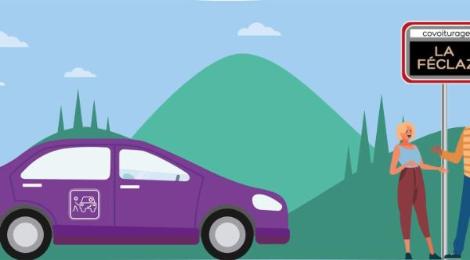
‘Synchro Covoiturage’ is a spontaneous public carpooling service developed by the Greater Chambéry area to serve outlying mountainous areas. It complements existing public transport and encourages intermodality. The service works without an application; passengers go to the dedicated stops and wait for a driver to show up. Variable message signs and simple street furniture are used to facilitate carpooling. Users register, obtain a carpooling card and a sticker for their car, guaranteeing safety. Implementing this project required considerable financial investment, as well as a number of events (almost 340 hours and 2,000 people met over 2 years).
Results
At the end of the two-year trial, the programme led to a net increase in carpooling journeys, particularly among senior citizens (30% of the first 100 people registered).
Comparative evaluation of 4 car-sharing incentive policies
